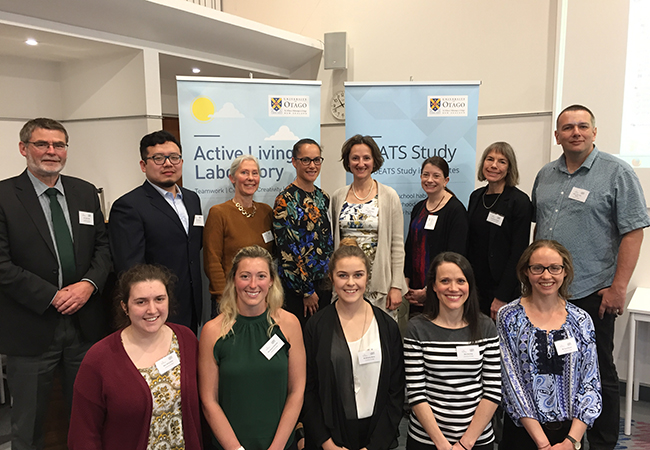
Members of the BEATS Research Group:
Back row, left to right: Gavin Kidd, Long Chen, Charlotte Flaherty, Dr Anna Rolleston, Associate Professor Sandra Mandic, Dr Susan Sandretto, Dr Kirsten Coppell and Associate Professor Antoni Moore;
Front row, left to right: Olivia Eyle, Jessica Calverley, Brittany White, Kimberley King, and Tessa Pocock.
A research group that is actively encouraging active transport to school by adolescents and making a contribution towards New Zealand's growing issue of insufficient physical activity, has received the University of Otago 2019 Research Group Award.
The Built Environment and Active Transport to School (BEATS) Research Team is using scientific knowledge to help break down barriers for adolescents' active transport to school through an innovative example of a community-academic research partnership.
Led by Associate Professor Sandra Mandic since 2013, the multi-disciplinary BEATS Research Programme has been working with the Dunedin City Council, all 12 Dunedin secondary schools and 11 out of 15 rural Otago secondary schools, reflecting the wide support and value of the programme to the local community.
Associate Professor Mandic, of the School of Physical Education, Sport and Exercise Sciences, says rural communities are facing very different issues from their urban counterparts such as increased distances to most destinations including schools.
“Our preliminary findings from rural Otago schools suggest that we need different interventions and approaches to address context-specific barriers to encourage active transport to school in both urbanised and rural areas of New Zealand.”
However, it is the strength of teamwork and cross-sector partnerships characterising the BEATS Research Programme that Associate Professor Mandic believes is the key for its success to date.
“The BEATS Research Team has demonstrated its ability to take an initial idea from a pilot study to the international stage in six years with study results influencing policy and planning locally and nationally,” Associate Professor Mandic says.
While the BEATS Research Programme has achieved good research success through published work, including 17 peer-reviewed journal articles and 39 technical reports, its focus on community involvement and translation into regional and national evidence-based policy and planning is where it is most distinguished.
Findings from BEATS research have been used by multiple government agencies including Ministries of Health and Transport and New Zealand Transport Agency, and mapping data has also been used to improve Dunedin's road safety and infrastructure around local secondary schools.
This year BEATS has also received a Health Research Council project grant to examine the effects of the cycling and pedestrian infrastructure changes on Dunedin adolescents' active transport to school and associated physical activity levels.
Associate Professor Mandic says the team works closely with stakeholders to ensure that findings are relevant and useful for the local community and could be used to inform future policies and planning.
“We have also established multiple avenues for communicating BEATS findings to not only the academic community but also to policy makers, health promoters and community groups.”
She says that receiving the Research Group Award is wonderful recognition of six years of dedicated collaborative multidisciplinary and cross-sector work to establish and grow the programme.
“We look forward to continuing to disseminate the BEATS findings and work with the stakeholders and wider community to create a momentum for a positive change towards a healthier and more sustainable future in New Zealand.”
For more information, contact:
Associate Professor Sandra Mandic
School of Physical Education, Sport and Exercise Sciences
University of Otago
Email sandra.mandic@otago.ac.nz
FIND an Otago Expert
Use our Media Expertise Database to find an Otago researcher for media comment.
